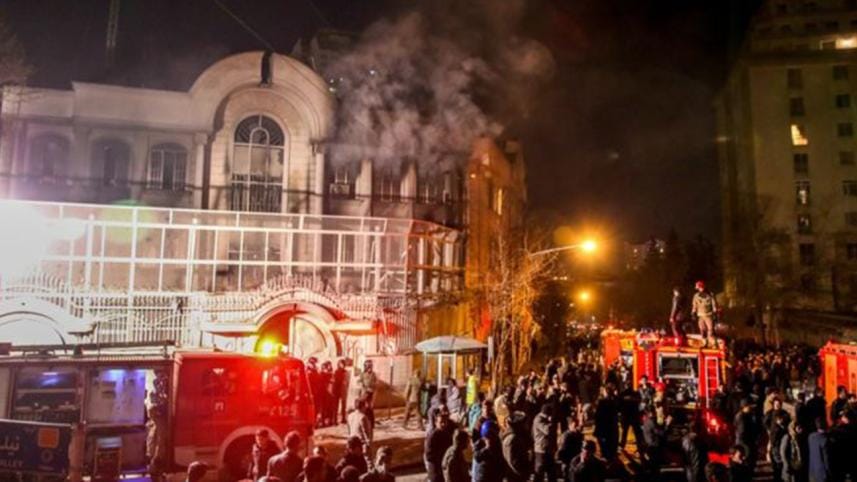US warns Saudi execution of Shia cleric could fuel tensions

The United States has expressed concern that Saudi Arabia's execution of prominent Shia cleric Sheikh Nimr al-Nimr could further exacerbate sectarian rivalry in the Middle East.
The US State Department urged leaders throughout the region to redouble efforts to lower tensions.
Iranian protesters angry over the execution stormed the Saudi embassy in Tehran, setting fire to the building.
Sheikh Nimr was one of 47 people executed for terrorism offences.
He was a vocal supporter of mass protests in the Saudi-Arabia's Shia-majority Eastern Province in 2011.
In a statement, US state spokesman John Kirby appealed to Saudi Arabia's government to respect and protect human rights, and to ensure fair and transparent judicial proceedings.
Kirby also urged the Saudi government to permit peaceful expression of dissent and, along with other leaders in the region, to redouble efforts to reduce regional tensions.
Sheikh Nimr's execution sparked anger and protests in Shia communities across the region, with protests in Saudi's Eastern Province as well as in Iran, Bahrain and several other countries.
In Tehran angry Iranian protesters stormed the Saudi embassy late on Saturday, smashing furniture and starting fires before they were dispersed by Iranian police.
Eyewitnesses described seeing members of a paramilitary volunteer group throwing petrol bombs at the building.
Earlier, the diplomatic reaction from Shia-led Iran, the main regional rival to Sunni-led Saudi Arabia, had been fierce.
The foreign ministry in Tehran said the Sunni kingdom would pay a high price for its action, and it summoned the Saudi charge d'affaires in Tehran in protest.
For its part, Saudi Arabia complained to the Iranian envoy in Riyadh about what it called "blatant interference" in its internal affairs.
As the main Shia power in the region, Iran takes huge interest in the affairs of Shia minorities in the Middle East, making it inevitable that the two countries would clash over Sheikh Nimr's treatment.
But one of the principal concerns of the Saudis is what they see as the growing influence of Iran in places like Syria, Iraq and elsewhere.
Sheikh Nimr was a prominent, outspoken cleric who articulated the feelings of those in Saudi Arabia's Shia minority who feel marginalised and discriminated against, the BBC's Middle East editor Alan Johnston reports.
He was among 47 people put to death on Saturday after being convicted of terrorism offences.
At least one protest march was held in Qatif, in Saudi Arabia's Eastern Province, defying a ban on public protests.
Protesters shouted the slogans "The people want the fall of the regime", and "Down with the al-Saud family", reminiscent of the 2011 protests in the wake of the Arab Spring.
Sheikh Nimr's arrest in 2012, during which he was shot, triggered days of protests in Eastern Province in which three people were killed.
Saturday's executions were carried out simultaneously in 12 locations across Saudi Arabia. Of the 47 executed, one was a Chadian national while another was Egyptian. The rest were Saudis.
The international rights group Amnesty International said the 47 executions demonstrated the Saudi authorities' "utter disregard for human rights and life" and called Sheikh Nimr's trial "political and grossly unfair".
Who was Sheikh Nimr al-Nimr?
--In his 50s when he was executed, he has been a persistent critic of Saudi Arabia's Sunni royal family
--Arrested several times over the past decade, alleging he was beaten by Saudi secret police during one detention
--Met US officials in 2008, Wikileaks revealed, seeking to distance himself from anti-American and pro-Iranian statements
--Said to have a particularly strong following among Saudi Shia youth
Sheikh Nimr's family said he had been found guilty, among other charges, of seeking "foreign meddling" in the kingdom but his supporters say he advocated only peaceful demonstrations and eschewed all violent opposition to the government.
Saudi authorities deny discriminating against Shia Muslims and blame Iran for stirring up discontent.
Saudi Arabia carried out more than 150 executions last year, the highest figure recorded by human rights groups for 20 years.
 For all latest news, follow The Daily Star's Google News channel.
For all latest news, follow The Daily Star's Google News channel.
Comments